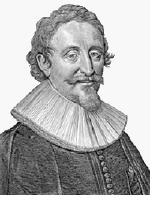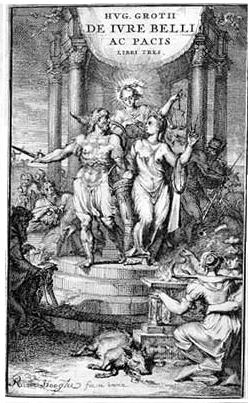Hugo (Hugeianus) de Groot (Latin: Hugo Grotius)
Dutch jurist and scholar who laid the basis of modern international law, b. 10 April 1583 (Delft, Netherlands), d. 28 August 1645 (Rostock, Germany).
 Hugo de Groot's father was the burgomaster (mayor) of Delft and the curator of the University of Leiden in Holland. The young Hugo therefore enjoyed an excellent education. He was a particularly gifted child and entered the university when he was 11 years old.
Hugo de Groot's father was the burgomaster (mayor) of Delft and the curator of the University of Leiden in Holland. The young Hugo therefore enjoyed an excellent education. He was a particularly gifted child and entered the university when he was 11 years old.
At the age of 15 Grotius accompanied a leading statesman, Johan van Oldenbarnevelt, on a mission to France, where he decided to study law at the University of Orléans. In 1599 he returned to Holland and established himself as an advocate in The Hague. He had already published two works in Latin prose and poetry about the political situation of the time, and the states of Holland decided in 1601 to appoint the promising young lawyer as their Latin historiographer.
The Dutch economy was expanding strongly at the time, but the united kingdom of Spain and Portugal exercised the monopoly over the sea trade, to which Dutch merchants were eager to get access. Eventually a Dutch admiral seized a Portuguese vessel, the Santa Catarina. In the ensuing argument between the rival states the Dutch East India Company asked Grotius to provide a legal justification. Grotius developed the principle of Mare Liberum ("Freedom of the Sea"), according to which the Portuguese had deprived the Dutch of their natural right to use the sea.
Grotius' desire to achieve the reunion of all Christian churches brought him into conflict with authorities when a controversy arose that set Oldenbarnevelt and the provinces of the republic against the States General. From 1613 he began to support Oldenbarnevelt's religious position. When the leaders of the opposition movement were arrested in 1618 Oldenbarnevelt was executed and Grotius sentenced to life imprisonement.
During his period in prison Grotius wrote the Inleydinghe tot de Hollandsche Rechts-geleerdheyt (Introduction to Dutch Jurisprudence). The work was published in 1631 and had wide influence; it served as law for South Africa from 1859 to 1901.
In 1621 Grotius managed to escape from the castle where he was held. He moved to Paris, where he was received with great honours. He could return to Holland in 1625, but threatened again with arrest he moved to Hamburg in Germany. In 1634 he was offered and accepted the position of Swedish ambassador to France. Discovering that he was not cut out for the diplomatic service he was granted permission to return to Sweden in 1644. But he soon longed to be back in Paris. Shipwrecked in the Baltic Sea on the way, he was rescued but died from exhaustion two days later.
Grotius was a scholar of many talents. His poetry in Latin and Dutch was not exceptional but his historical writings, which followed the style of Tacitus, are valuable and accurate. His fame, however, rests on his legal works, particularly the work De Jure Belli ac Pacis (On the Law of War and Peace) published in 1625. Apparently a synthesis of previous ideas developed by others, it is based on the idea of a natural law that derives from human nature and that governs the relationship between nations and states.
With De Jure Belli ac Pacis Grotius laid the foundations for international law. Before the 16th century a concept of international law did not exist; relations between states were regulated by direct negotiation based on the interests of the parties involved (and their relative military strength). The requirement for an international law arose as a result of global rivalries between the European trading nations; colonialist expansion made it a necessity.
Grotius provided the expertise and had the motivation to develop the legal basis for the colonial period. He defined the "territorial sea" (that part of the sea over which coastal states have full jurisdiction) as the sea within 3 nautical miles (5.5 km) from the coast - the distance that could be covered by the cannons of the time.
Grotius was convinced of the cultural and spiritual mission of colonialist expansion. During his time in prison he wrote the poem Bewijs van den waren Godsdienst (Proof of the True Christian Service), which celebrates the Dutch sailors as peaceful propagators of Christianity. The Latin prose version De Veritate Religionis Christianae of 1627 made Grotius' name famous; translations into 13 languages, including Arab and Urdu, accompanied European sailors to all continents.

De Jure Belli ac Pacis, published 1625
home
 Hugo de Groot's father was the burgomaster (mayor) of Delft and the curator of the University of Leiden in Holland. The young Hugo therefore enjoyed an excellent education. He was a particularly gifted child and entered the university when he was 11 years old.
Hugo de Groot's father was the burgomaster (mayor) of Delft and the curator of the University of Leiden in Holland. The young Hugo therefore enjoyed an excellent education. He was a particularly gifted child and entered the university when he was 11 years old.